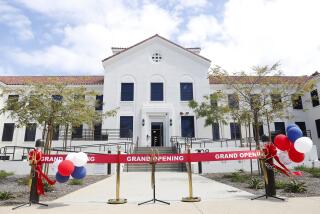Faces of VA healthcare: Patients and would-be whistle-blowers
Growing evidence suggests the VA healthcare system has overworked physicians and schedulers who often hide how long patients must wait. Here are some stories of patients and would-be whistleblowers.
Walter Burkhartsmeier
A retired Navy veteran who did five tours in Vietnam, Walter “Burgie” Burkhartsmeier first started getting shooting pains down his left arm in 2011. Then a lump began to form on the same limb. His doctor at the VA Puget Sound Medical Center in Lakewood, Wash., sent him to get an MRI at the VA’s Seattle facility.
It took two months to schedule the test, but when Burkhartsmeier, 73, and his wife, Lesley, 67, arrived at the hospital from their home in Suquamish, Wash., the machine was broken. Another month passed before the test could be scheduled. That was January 2012.
For the next 18 months or so, the trim, bearded Navy man heard nothing. “We figured it must have been OK because we didn’t hear from anyone,” he said. “It’s a good thing I’m retired. I’d be dead by now probably.”
Burkhartsmeier’s doctor went on leave, and his patients were divided among other physicians, the veteran said. In all that time, no one looked at the test results — until his original doctor came back in summer 2013, saw the results and told Burkhartsmeier to come in immediately.
Another MRI and consultation with neurologists, Lesley said, revealed that “not only is the nerve trapped, but there’s what’s called osteoblasts — little bony projections — and they’re rubbing on his spinal cord. If he gets rear-ended or pushed from behind or falls, he’ll be paralyzed from the neck down.”
Burkhartsmeier was told that surgery was not an option, Lesley said, and that he should “go home. Live your life as best as you can for as long as you can. Don’t fall down.”
::
Thomas Breen
Thomas Breen, a Brooklyn native and amputee who moved to Phoenix in 2012, was in remission for bladder cancer after he was treated at a Veterans Affairs hospital in New York.
When he arrived at the Phoenix VA hospital emergency room last September he was examined, discharged and told to wait for a call to be given an appointment. No tests were conducted to determine whether his bladder cancer had returned.
His daughter-in-law, Sally Barnes-Breen, said she called the VA hospital every day and left several messages to book an appointment for him but never succeeded. The 71-year-old Navy veteran died of bladder cancer two months after the emergency room visit.
She recounted a conversation she had with Breen, who “believed and trusted the VA.” He was frank.
“Don’t let me die,” he said. Barnes-Breen didn’t know what to say.
“Then you tell the VA they did wrong by me,” he told her.
“I will,” she replied.
::
Lisa Lee
A Navy reservist who worked as a medical support assistant at a VA hospital in Fort Collins, Colo., last year, Lisa Lee says she resisted orders to manipulate patient appointment records, complained to her superiors — and was transferred and later placed on administrative leave.
A manager and another support assistant at the facility also resisted. They too were transferred and later placed on leave, Lee said.
“We were all punished,” she said. “I didn’t do what they told me to do. I wasn’t cooking the books.”
Lee explained that employees were instructed to manipulate appointments to make it appear that the facility was meeting a VA mandate to schedule all patients within 14 days of their “desired” appointment date: “They would tell the veteran, ‘We don’t have an appointment till December, is that OK?’ And the veteran says, ‘Yeah, I guess, what other choice do I have?’ Then they would put that date in as the desired date, and then there is zero wait time because that is now his preferred date.”
Lee said she filed for whistle-blower protection in September, then was called to active duty in January. She is scheduled to return in September to her most recent VA job, in Cheyenne, Wyo..
“I’m afraid to go back,” she said.
::
Dr. Jose Mathews
Dr. Jose Mathews, chief of psychiatry at the VA St. Louis Health Care System, attributes delays at the facility to “the unholy alliance of indifference and incompetence.” Rather than serving veterans, some VA staffers “blame every problem on the veterans,” he said.
Mental health patients at the St. Louis facility experience 25-day waits for initial doctor visits and 30-day waits for follow-up appointments, Mathews said.
Those numbers could be cut in half, he said, if doctors spent full working days seeing patients. Instead, roughly half the staff at the facility — including psychiatrists and psychologists — do not put in full work days with their patients, resulting in poor care and an artificial backlog in patient appointments, he said.
After repeatedly complaining to his superiors, Mathews said, he filed for whistle-blower protection with the Office of Special Counsel, an independent federal agency. He said the VA placed him under “administrative investigation” at full pay and benefits in September for “creating a hostile work environment.”
“I thought it was a joke,” he said. He is awaiting the results of the investigation.
::
Sandi Niccum
At 78, Sandi Niccum was a blind Navy veteran who volunteered to help other disabled former service members negotiate the labyrinth of bureaucracy to get timely care at VA facilities in Nevada. But as she suffered more than five hours of abdominal pain in October while waiting to see a VA doctor in North Las Vegas, there was no one to help her.
As documented by a friend who was with her, she sat slumped in her wheelchair, pounding her cane against the floor in frustration. A doctor finally told her she needed more tests, but by then she was so tired and angry, she insisted on going home.
She sought treatment at two other hospitals, where she was diagnosed with a tumor-like mass in her abdomen. She died less than a month later.
Although an April report by the House Veterans Affairs Committee and Office of Inspector General did not directly tie Niccum’s death to her care at the North Las Vegas VA medical center, investigators faulted the facility for the long emergency room wait and for not rechecking her status as she waited.
“Nobody deserves to be treated like that; certainly not our veterans,” said Rep. Dina Titus (D-Nev.), whose office had called for the federal investigation into Niccum’s treatment.
Titus, the ranking member of the House VA subcommittee on disability assistance and memorial affairs, attributed some of the problem to a shortage of doctors in Nevada overall, as well as in its VA facilities, where “doctors are flown in from all over the nation for short stints — especially in the ER.”
Titus added: “The fact that the independent audit did not conclude that the hospital was responsible for Sandi Niccum’s death, that does not change the fact that she sat and waited for such a long time. And during that time, nobody was checking on her. It’s a tragedy.”
::
Anson ‘Dale’ Richardson
Anson “Dale” Richardson, a Texas Army veteran, died in November after waiting two months to start chemotherapy at a Veterans Affairs clinic — even after his doctor told officials to begin treatment immediately for laryngeal cancer. He was 66.
His wife of 37 years had tried to get her husband treated sooner, but said he was accustomed to waiting for VA care. Richardson was a combat medic who served two tours in Vietnam.
Now Carolyn Richardson, 70, a retired secretary living in Giddings, Texas, wishes she had asked more questions, though she isn’t sure whether to hold the VA accountable for his death.
“Nobody knows for sure whether, if he got the treatment, it would have made a difference,” she said.
After her husband’s death, she didn’t want to complain — until she learned of widespread problems in the department.
“What do I do now to help somebody else? That’s what it’s all about: to help somebody else down the road so that they don’t lose somebody if they don’t have to,” she said.
A VA spokeswoman said she could not comment about Richardson’s case, citing medical privacy, but said the agency had asked a doctor to review it.
::
Brian Turner
Brian Turner, 40, of San Antonio has reported to the U.S. Office of Special Counsel that he and other scheduling clerks at VA clinics in Austin and San Antonio were directed to ensure that wait times were “as close to zero days as possible.”
He said clerks logged patients’ desired appointment dates to match openings, making it appear as though there was little to no wait time. Turner said clerks were also told not to use a VA tool called the electronic waiting list. Veterans were added to the list if the closest appointment was at least 90 days away — so using it would reveal the volume of delays.
Turner, a disabled Army veteran, spoke out the day after he saw news reports about similar practices at the Phoenix VA.
The local VA has admitted information was left out of the electronic waiting list, but denied his other charges.
“If they continue to say that my allegations are false, the question is: Why is everybody else reporting it in other states and cities?” Turner said. “What’s going to happen in a few months once everyone starts entering in the true data? What’s going to be the VA’s excuse then?”
More to Read
Sign up for Essential California
The most important California stories and recommendations in your inbox every morning.
You may occasionally receive promotional content from the Los Angeles Times.










